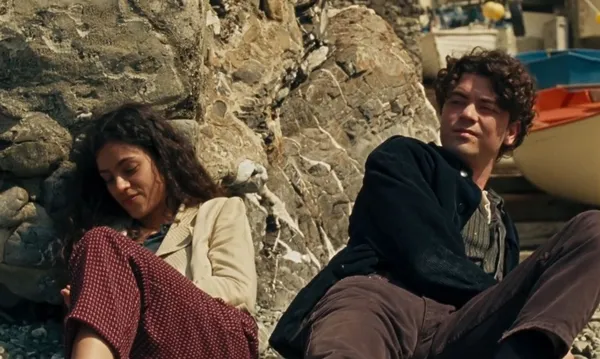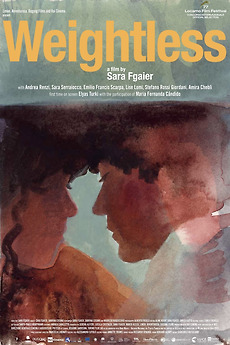Eye For Film >> Movies >> Weightless (2024) Film Review
Weightless
Reviewed by: Anne-Katrin Titze

Weightless (Sulla Terra Leggeri) review - Sara Fgaier chose a Julian Barnes quote from Levels Of Life as epigraph: “We live on the flat, on the level, and yet - and so - we aspire. Some soar with art, others with religion; most with love. But when we soar, we can also crash.”
Weightless (Sulla Terra Leggeri) a highlight of Cinecittà and Film at Lincoln Center’s 24th edition of Open Roads: New Italian Cinema, stars Andrea Renzi, Sara Serraiocco, Emilio Scarpa, and Lise Lomi. The story by Fgaier and Sabrina Cusano, who both co-wrote the screenplay with Maurizio Buquicchio, links love and memory and in an exciting new cinematic way combines past and present, the life of the mind and that of physical remnants of what may never have been.

A man, whom we will later get to know as Gian (Andrea Renzi) walks through a corridor and closes a door. The camera is blurry and becomes un-blurred and sharp on the man’s face. He is at a wake, but whose? He seems as confused as we are. People come by and hug him, he leaves and takes a seat on a sofa.
Next we see him walking down a different corridor at a university and into a lecture hall where he has his students listen to an old Tunisian chant. It is a ritual dance with the spirits, music therapy before it was called that. A healing trance, pupils’ faces, another corridor, images of a brain. His daughter Miriam (Sara Serraiocco) and her little son Elyas (Elyas Turki) will be staying with Gian, who seems to have decided, consciously or not, that amnesia is the way for him to go in this moment.
But the past, or love, has a hold on him. When he opens a diary from 1983, he discovers anew an encounter that would change his life. Forty years ago, “I’m about to see you again” - Fgaier’s Weightless lifts us out of the restraints of linear time and thus any conventional flashbacks.
As the camera floats over objects, over instruments, into the sky, past an old steamship out onto the ocean and through flashes of colour, there will be a beach and steps of a mule track. A younger man, a younger Gian (Emilio Scarpa) is seen in photographs with a woman (Lise Lomi). Is this Leila? Who is Leila? And why does the Gian of the present feel the urge to burn the Polaroids of the past?
Like the protagonist we are swept up by a wave of questions about aviation and identity and the unbearable heaviness of memory. Two people, deeply and instantaneously infatuated, agree to meet again in five months in Tunisia at the lighthouse, but life has other plans. The glorious cinematography by Alberto Fasulo and the well-placed score by Carlo Crivelli invite the mind to wonder at just the right spots.
Fgaier uses archival footage, organically interspersed into the layers of one grieving man’s life, to elevate the narrative into the realm of universal validity. Men on cliffs run and jump and parachutes fall from the sky sometime during the last century and ever since. We soar and crash and soar again in life. Is a year late too late to an appointment?
Adding Gian (Stefano Rossi Giordani) and Leila (Amira Chebli) in the Nineties and an older Leila (Maria Fernanda Cândido), simultaneously adheres to movie casting conventions and also makes us question more profoundly notions of identity over time. Is this person who was me ten years ago perhaps something of a stranger now?
Reviewed on: 22 Jun 2025
















